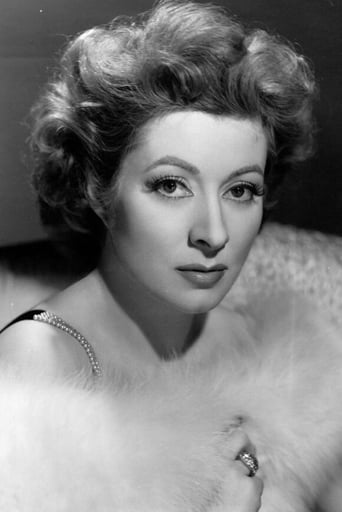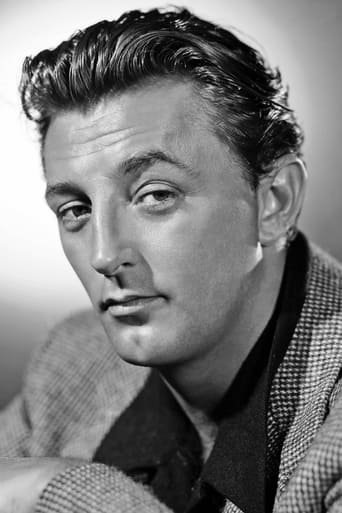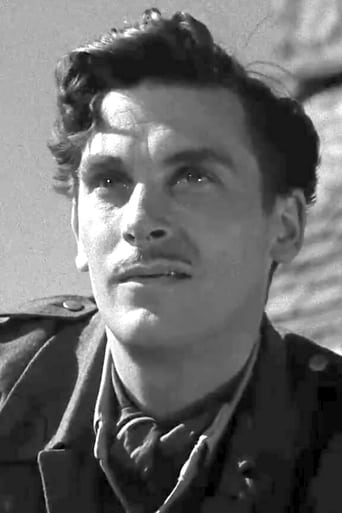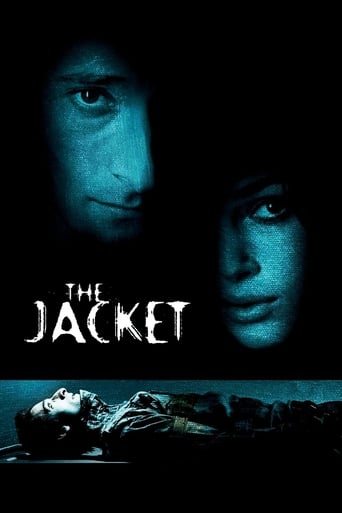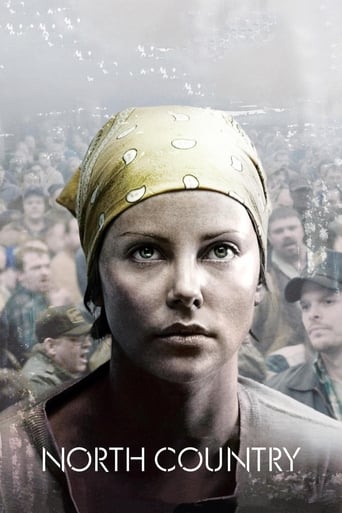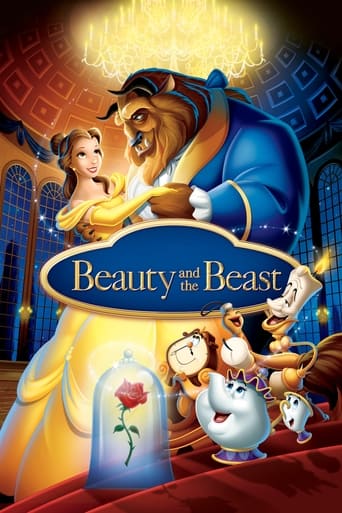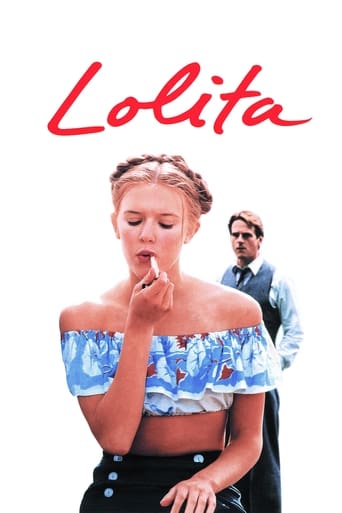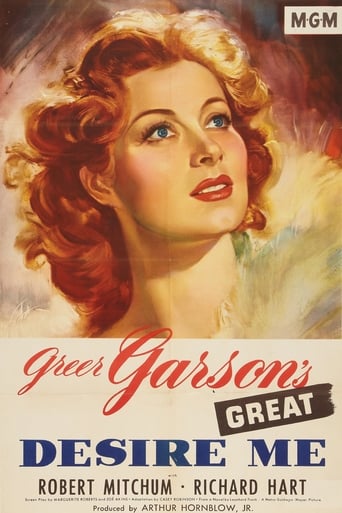
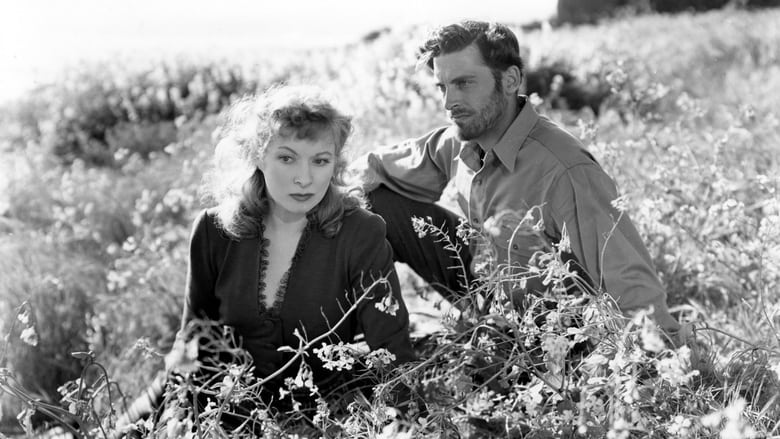
Desire Me (1947)
A war widow falls in love with the man who informed her of her husband's death.
Watch Trailer
Cast


Similar titles
Reviews
I just finished viewing "Desire Me" (bad title, I admit), which I began with a bit of trepidation--so off-putting was its reputation as an MGM stinker--but I found myself drawn into its unique realm mainly by the compelling performances of G. Garson and R. Hart. Sadly, R. Mitchum, one of my favorite actors of all time, had little on screen time in which to create a character of depth. Perhaps the filmmakers didn't realize that they had (unintentionally?) created a fine piece of magic realism--the almost mythic setting in a remote and traditionally mystical part of France (the realm of Breton-Arthurian legend and the arcane spiritual 4th dimension of the Celts), land of fog and mists. There are the "singing pool" that Garson shows to Hart, the doppelganger figures of Hart and Mitchum, a deeply troubled Garson's brave navigation of the rough emotional waters between these two men, the superbly photographed climax in deep fog in which one could scarcely distinguish between Mitchum and Hart. The only jarring note was the badly read voice-over introducing a saccharine tone into the concluding moments of the film. I think this is a must-see for anyone claiming to be a knowledgeable fan of 1940s films.
This film has an odd cast--a bunch of non-French actors playing French people without traces of accents. It's hard to imagine Robert Mitchum as being a man living in Normandy, but he and Greer Garson both star in "Desire Me"--along with Richard Hart.The film begins shortly after WWII. Garson has been living alone since the war began--her husband (Mitchum) in a German concentration camp. She'd since received word that he was dead, but she still is holding out hope that he'll return. A man arrives (Hart) who tells Garson that he was Mitchum's friend and saw him die while trying to escape--and he knows so many, many details about her that his story about being Mitchum's best friend made sense.A bit later in the film, things began to stop making sense. While Garson had fallen in love with Hart, he proved to be very moody and unpredictable--so much so that it makes you wonder how Garson would want to be with this guy. Some of this was done because it fit in with the plot--some of it was due to sloppy writing.Eventually, Hart gets Garson to agree to sell her husband's old business and move to Paris with him. However, in true Hollywood fashion, Mitchum arrives in town--and it's obvious Hart is a liar and cheat. This leads to a showdown between the two men--and Hart seems quite willing to kill his 'old friend'.While this film has some interesting moments and the romance between Garson and Hart is nice to watch (at least at first), the film is far-fetched and a bit confusing. The part that had me shaking my head was Garson's reaction to Mitchum's return--behaving like a woman guilty of something. Were they trying to imply she'd slept with Hart? If not, why the guilt and why would she tell her beloved husband that she would leave him?! In fact, none of this made any sense---and I really wanted it to. And, following the showdown, Garson's reaction seemed even more bizarre---what was motivating her?! Why did she act that way?! Didn't this all seem pretty sloppy?! Apparently others thought the same, as the film was seen as a big disappointment--and I can see why. With this locale and the basic script idea, it should have been a lot better--and more polished and coherent.
Why didn't they transpose the action to the USA? That said,George Cukor's vision of Britanny is not this false:this is a place in France where religion plays a prominent part and Maryse feeling guilt and attending the Pardons ceremony make sense ;besides ,one of the supporting characters is a priest ,Maryse 's confidant (and confessor).He preaches a fatalistic moral,claiming that anyway Renaud was born a loser and it was meant to be ! "Desire me " is a story with an atmosphere of mystery ;in Cukor's filmography,it's close to "gaslight" "keeper of the flame" (a character who is not what he seems to be,just like in "desire")or " a woman's face ".And ,as Britanny is a French region the culture of which is full of legends ,it's not a bad choice after all;Paul is a male Rebecca whose presence can be felt everywhere ,on the shadow of a wall,in a tune played on the piano (it's an old French classic called "Vous Qui Passez Sans Me Voir" = you who pass by without seeing me),or in the boathouse .The ball ,on the other hand ,features music which doesn't sound Breton folk at all,in spite of the costumes.Like this?try these..." Les Louves" Luis Saslavsky "Carrefour" (Bernard,1938) remade as "Le Retour De Martin Guerre" (Vigne ,1983) remade as "Sommersby" (Amiel,1992)
As has been noted elsewhere, during the filming of "Desire Me," Ms. Garson and Richard Hart were swept into the sea by a wave along the rocky coast of California. She nearly lost her life, and as it was, sustained severe injuries that required several surgeries. All this for a misfire of a film.If not for the luminous presence of Greer Garson, this movie wouldn't be worth anyone's time. Considering the cast and director (George Cukor, who removed his name from the credits before the film's release) it's a wonder how it turned out so relatively poor. One would think the script's weaknesses should have been readily apparent. {SPOILERS AHEAD} The outline of the plot is fine: Paul (Robert Mitchum) is imprisoned during WW-II in a German POW camp. He spends his time telling a fellow prisoner, Jean (Hart), details about his life with his wife, Marise (Garson). Jean, whose life has been less than idyllic, becomes absorbed in these tales, and soon begins to think of these stories as HIS stories. When he and Paul attempt escape, Paul is shot, but Jean succeeds. He goes to Paul's home he has come to know so well and tries to claim Marise, who has been faithfully waiting for Paul for several years, as his own--in spite of the fact that he knows (or at least strongly suspects) that Paul is actually still alive. That outline could have been turned into a fine film--but the details were its undoing. Crucial to the story is the devotion Marise and Paul have toward each other.Unfortunately, this supposed great love is spoken of, but never dramatized. We get one brief flashback of their marriage ceremony. We don't see their love grow, never observe its intensity. Yet we are supposed to be invested in their relationship. Without that investment the final reconciliation fails to move us, and so the ending falls flat. An even bigger failing is how the relationship between Marise and Jean plays out. He immediately begins to pressure her to form a relationship with him--this in spite of the fact that until he tells her that he saw Paul die, Marise still believed him to be alive. No matter how lonely she might have been in the years she awaited Paul's return, she obviously would need some months to grieve her loss. To have someone pushing her into a relationship the very day she hears the news would be off putting to say the least--terrifying and enraging being even more likely reactions. Instead, we are to believe that Marise would experience only some relatively vague misgivings, and within about a week is sufficiently recovered to consider marrying this man (so much for this supposed great love between Paul and Marise). For this bit of absurdity to work, all one would need do is, first, provide more background (lots more background) to the relationship between Marise and Paul. Second, make Jean more crafty. Instead of fairly pouncing on Marise, have him offer his friendship and support. Have their relationship grow over the course of MONTHS, not days. These two changes alone might have turned the movie into a classic--IF Ms. Garson and Mr. Mitchum could have developed some chemistry between them. As it stands, they had none. With only 4 minutes of screen time together, how much could they be expected to generate? It's too bad. They were two such great stars . . . it would have been interesting to see them together. Still, for all its considerable faults, I give the film a 5 out of 10 on the basis of the great Greer Garson's presence, some great cinematography and an interesting, if poorly realized, premise. All in all, it's too bad Ms. Garson didn't elect to work in some other, more rewarding--and less painful--project.


